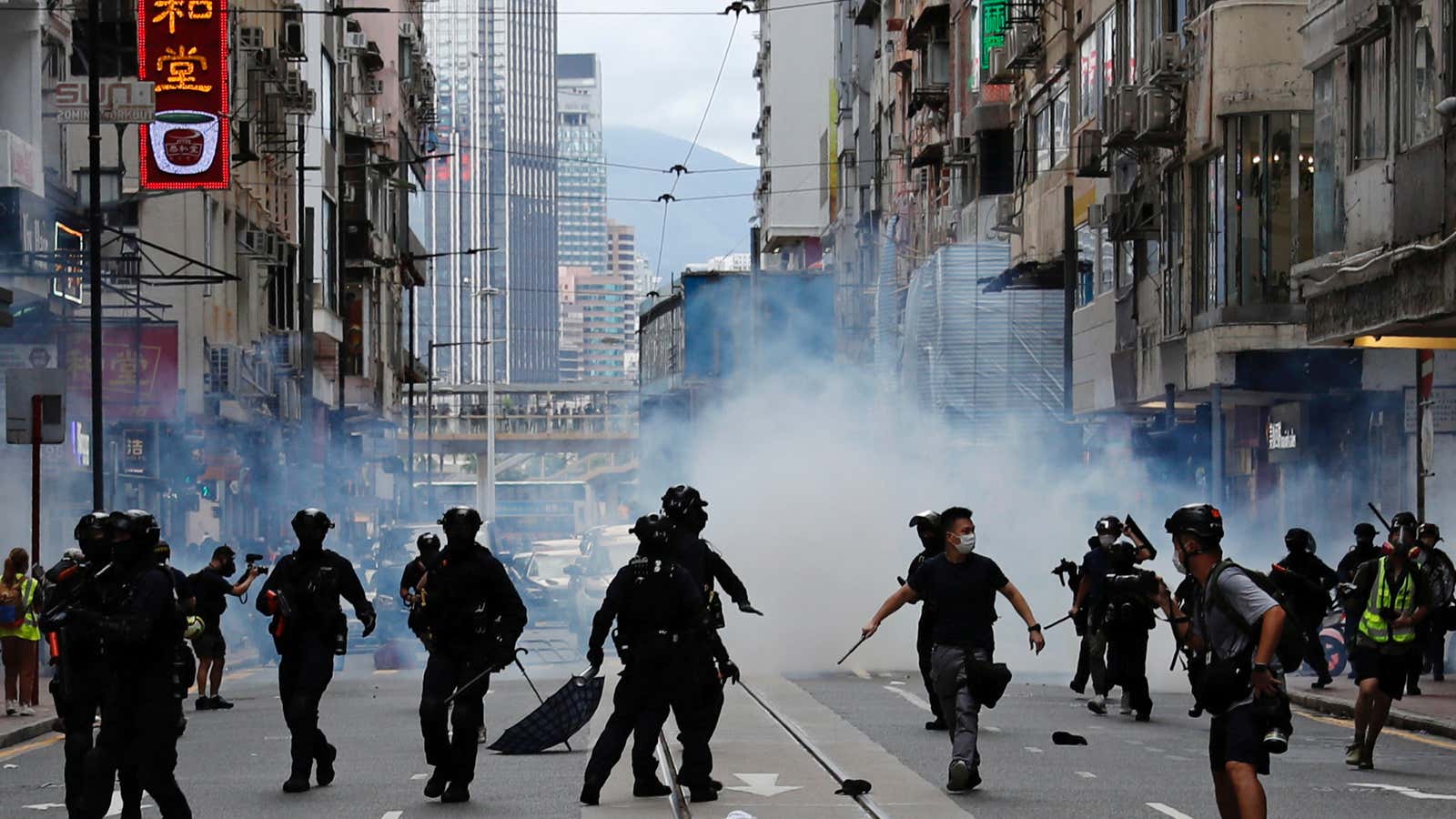Ever since Hong Kong returned to Chinese rule in 1997, its people have been on the lookout for signs that Beijing is dismantling its unique status as the freest city in China—and reneging on the terms of the territory’s handover from Britain. Under the “one country, two systems” framework, Hong Kong was supposed to enjoy a large degree of autonomy from China for 50 years, until 2047.
Hong Kong doesn’t get to choose its own leader. Rather, a committee of 1,200 people representing different interest groups chooses the chief executive. As a result, Hong Kongers can’t just vote out a person whose leadership they oppose. Instead, they take to the streets when they think something is going seriously wrong in the city—and particularly in its carefully calibrated relationship with Beijing. In 2014, thousands of people occupied streets to protest a long-awaited plan for universal voting that came with too many strings attached.
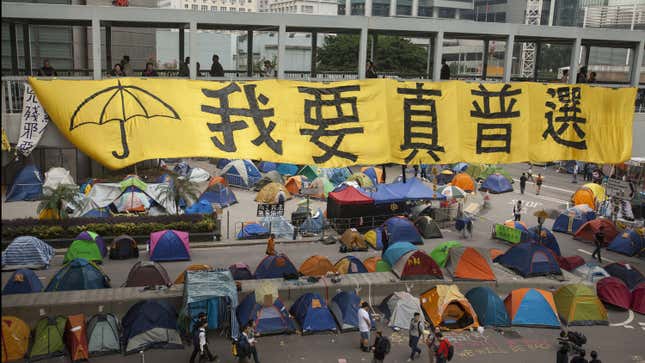
In the years since, Hong Kong simmered with frustration and fear—but didn’t erupt—as booksellers vanished, democracy activists were jailed, and young lawmakers were disqualified from office. But behind the scenes, a global effort to bring greater attention to what was happening in the city began taking shape.
In 2019, when the city’s chief executive tried to pass an extradition bill that would have allowed Hong Kongers to be sent to the mainland for trial, over widespread objections, people turned out in massive force for what many called a “last stand” for Hong Kong. The city-wide protests turned fiery as the year wore on and receded only when the coronavirus began spreading globally in January.
That brings us to this year, when after dealing with its coronavirus epidemic, Beijing lost patience with the Hong Kong government. It imposed a national security law that overnight turned the city from a relatively free place, to one where it’s possible to be arrested for shouting a slogan. This is how it happened.
April 17: Beijing’s liaison office in Hong Kong declares that it has full authority to weigh in on Hong Kong’s affairs, going against two decades of legal precedence deriving from the territory’s mini-constitution, which barred Chinese government departments from interfering in the territory’s affairs.
April 18: Fifteen veteran leaders of the city’s democracy movement are arrested over their roles in last year’s protests, although the demonstrations were decentralized and anonymously organized.
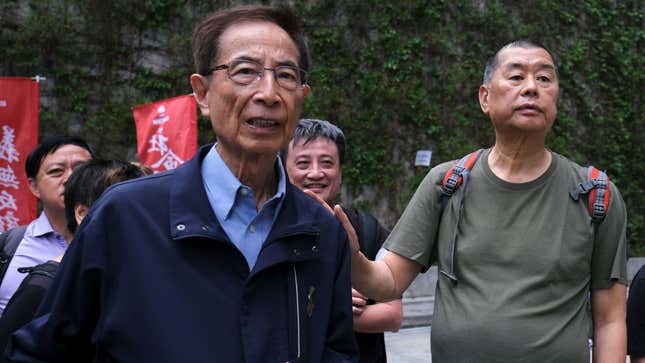
May 21-22: Chinese state-run media report that the Standing Committee of the National Peoples’ Congress (NPC), China’s legislative body, has drafted a resolution to enact a national security law in Hong Kong, bypassing the city’s legislature. The committee sends the draft decision to the NPC the next day, calling the law necessary because the protests in Hong Kong harmed national sovereignty.
May 28: The NPC approves the decision to draft a national security law for Hong Kong, criminalizing secession, terrorism, collusion with foreign forces, and subversion—a charge often brought against activists and lawyers in the mainland. Hong Kong lawmaker Claudia Mo called it the beginning of a “sad and traumatizing era” for the city.
June 4: Hong Kong bans a Tiananmen Square vigil in Victoria Park—held every year after Beijing cracked down on student protesters in 1989—citing coronavirus concerns. Many fear it will not be held again, officially. Thousands turn out anyway.
June 18: The NPC’s Standing Committee reviews a draft of the 66-article law in a three-day session. While Hong Kong remains in the dark about its provisions, it is heavily marketed in the city as a good thing that will only affect a few people.
June 30: The NPC passes the law, which is then signed by president Xi Jinping. Residents of the city only got to read the law for the first time after it was “gazetted,” and went into effect at 11pm. Turns out, it covers everybody on earth.
July 1: Hong Kong police introduce a special purple flag to tell demonstrators that waving certain banners or shouting certain slogans could be a crime under the new law. Ten people are arrested under the law, including one for waving a flag that said “Hong Kong independence.” The UK says China is in violation of the 1984 agreement governing the return of Hong Kong on July 1, 1997, and announces that millions of Hong Kongers will be eligible for UK citizenship.
July 2: The government bans the popular protest slogan “Liberate Hong Kong, revolution of our times.” Activist Nathan Law reveals in a Facebook post he has fled to London, after earlier in the week disbanding Demosisto, the democracy organization he founded with Joshua Wong in 2016.
July 4: Public libraries remove books written by democracy activists from circulation.
July 6-7: The police are granted sweeping new powers, including to intercept communications and take down internet content.
July 8: Beijing’s national security office in Hong Kong is inaugurated in a hotel in the Causeway Bay area, near Victoria Park, where protests usually kick off. The government bans school students from singing the territory’s unofficial anthem, Glory to Hong Kong.
July 10: Police raid the offices of the Hong Kong Public Opinion Research Institute, which conducts regular polls about sentiment toward the government, police, and protesters, and is also organizing “primaries” for the democracy camp, an unofficial voting exercise to help select the strongest candidates for legislative elections in September.
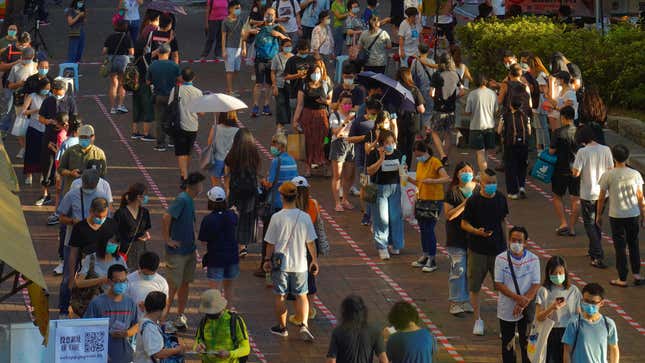
July 14: The US revokes Hong Kong’s special status, which will end preferential trade and travel treatment.
July 21: Hong Kongers mark the first anniversary of the Yuen Long attacks, when thugs attacked people inside a metro station, deepening anger against the police last year. They were seen as colluding with the attackers, and dragging their feet in response to thousands of distress calls from the area.
July 28: A University of Hong Kong committee fires sociology professor Benny Tai for misconduct due to his convictions for his role in the Occupy protests of 2014; a day earlier, another Hong Kong university decided not to renew the lecturing contract of opposition law maker Shiu Ka-chun, who was also convicted in connection with the 2014 protests.
July 29: Four student members of a disbanded pro-independence group are arrested for allegedly secessionist social media posts by officers from the Hong Kong police’s new national security unit. If convicted, they could face life imprisonment.
July 30: A dozen candidates, including democracy activists Joshua Wong, are disqualified from running in the September legislative elections. Even criticizing the enactment of the new law “in principle” can be grounds for disqualification, the Hong Kong government says.
July 31: Days after news outlets leaked rumors of a delay, the government announces the Sept. 6 vote will be delayed by a year because of the coronavirus. Hong Kong police issue arrest warrants for six overseas activists for allegedly colluding with foreign forces, including Nathan Law, and Samuel Chu, founder of a DC-based Hong Kong advocacy group, and a US citizen.
Aug. 6: More than two dozen people are charged with unlawful assembly for participating in the June 4 Tiananmen Square vigil.
Aug. 7: The US places sanctions on 11 people for undermining Hong Kong’s autonomy, including chief executive Carrie Lam, and the current and former police chiefs. China responds with its own sanctions on US lawmakers.
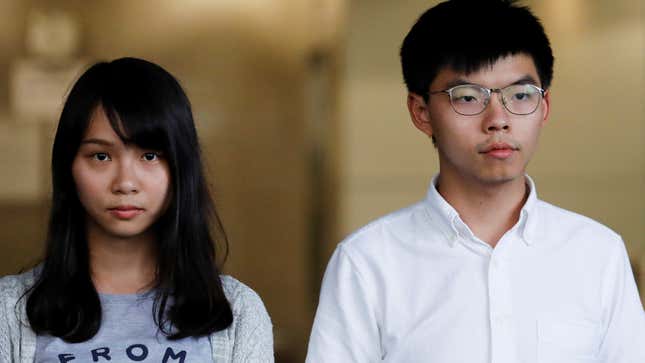
Aug. 10: Police arrest media tycoon Jimmy Lai, the owner of the newspaper Apple Daily, for foreign collusion, as well as several family members. One of the few news outlets not controlled by companies linked to Beijing, the newspaper is known for its sharply critical reporting of the Communist Party. People in Hong Kong protest the arrest by buying shares in the paper’s parent, Next Digital, sending its price up more than 1,000% over two days.
Local media also report a new unit in the immigration department set up under the national security law is vetting sensitive visas, such as those of foreign journalists—the immigration department hasn’t confirmed or denied its existence.
The same day, police also arrest 23-year-old democracy activist Agnes Chow for colluding with foreign forces. Her supporters have dubbed her the “real Mulan,” after the fearless young warrior.
Read more of Quartz’s Hong Kong coverage
- What the 2020 national security law means for Hong Kong
- The 2019 democracy protests—and the extradition law that sparked it
- Hong Kong’s hopes and fears 20 years after the handover
- What did the 2014 Umbrella Movement accomplish?
